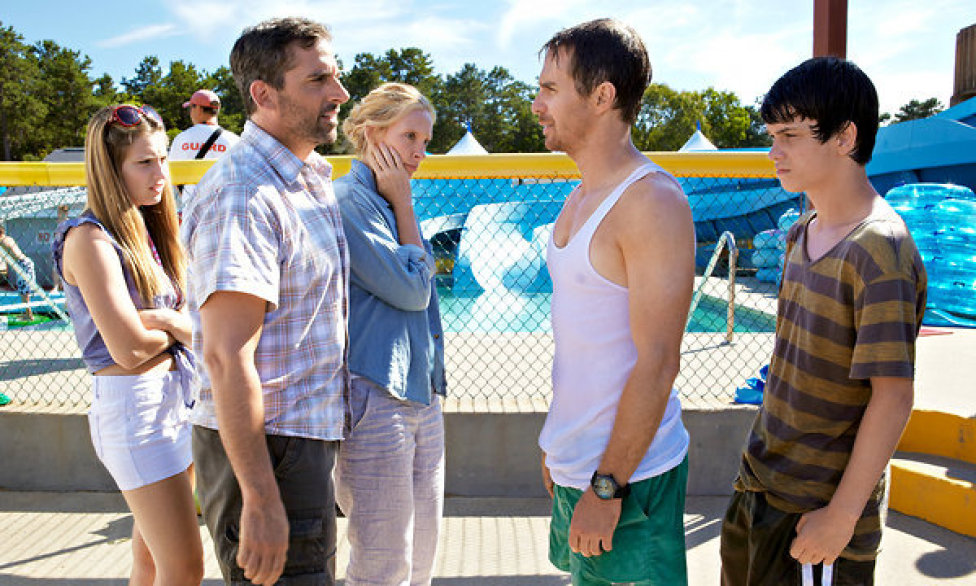Culture
Movie review: “The Way Way Back”

The Way Way Back
dir. Jim Rash and Nat Faxon
Release Date: Jul 05, 13
- 1
- 2
- 3
- 4
- 5
- 6
- 7
- 8
- 9
- 10
Fresh off their Academy Award for The Descendants’ screenplay, writer-director tandem Jim Rash and Nat Faxon decided to next take a summer trip to the Northeast. While many films have followed soulful teenagers through the rituals of growing up, The Way Way Back is less about those rituals and more about the gauntlet of humiliations many teenagers run when they lack the autonomy to get up and go. Over one summer in his mother’s boyfriend’s beach house, Duncan (Liam James) struggles with his mom’s (Toni Collette) identity crisis, the boyfriend’s (Steve Carell) barely veiled contempt for him, his inability to retaliate, his family’s immature friends (a perpetually inebriated Allison Janney among them) and his total lack of escape. He eventually finds this in the Water Wizz water park, run by a colorful cast of characters including the slacking but well-meaning Owen (Sam Rockwell), and along the way manages to pull his life together. Sort of.
The biggest difference between The Way Way Back and virtually every other Sundance-approved coming-of-age dramedy to come out in the past 15 years is Liam James. Where so many (usually male) protagonists in these films have been bashfully handsome, secretly magnetic young men just looking for the right spark or a Manic Pixie Dream Girl to give their lives direction, never appearing as awkward as their respective films tell you they are, Duncan is so uncomfortable in social situations that it often hurts to watch. James is excellent, nailing the halted speech and mumbling cadence of a teenager who’s not come into his own yet and has no idea how to get there. During many scenes, particularly his interactions with comely next-door neighbor Susanna (AnnaSophia Robb), Duncan struggles so hard just to summon anything to say that it seems like the lodged words in his throat might strangle him if he continues.
These are the best moments in The Way Way Back, and the film would have benefitted from quite a few more of them. When Rash and Faxon’s script follows Duncan, there’s an emotional richness to the film that it often struggles to reach whenever he’s in the background, which by nature of the character happens a little too often. Since Duncan is as much a cipher for maladroit teenagers the world over as an actual person (understandably at his age), he’s a perfect canvas for the events of the film to be painted around and upon. When he sings REO Speedwagon by himself in a cracking voice in a moment of solitude, or attempts to hold even a basic conversation with Susanna, the film shows its earnest love for him, as it does whenever Owen appears (Rockwell is the best he’s been in years here), but it’s often not enough. Too many stories come and go throughout the film, to the point where many don’t land with the impact they might, particularly the later scenes of relationship collapse between Collette and Carell. Faxon and Rash try to understate the material, when amplifying it to the levels of teenage melodrama would’ve been beneficial.
That’s not to say that The Way Way Back doesn’t occasionally prove that Fox Searchlight’s huge investment at this year’s Sundance was worth it. Water Wizz becomes a cockeyed heaven for Duncan, and it’s here that the film finds its true center. Away from the God’s-honest cruelty of the beach house (Carell is monstrous here in a way he’s never before been), Duncan is allowed to come to life, warmly adopted by breakdancing vacationers and pool staff alike. And in its most brilliant stroke, Duncan isn’t suddenly granted a silver tongue or a groundswell of confidence. Where many films would give Duncan some kind of Big Moment to prove his mettle, the one he gets here isn’t grandiose so much as it’s a personal victory for somebody who’d never claimed one before. He’s still trapped in the way, way back of a woody wagon, bound back for waves of uncertainty, his mother a mess and his never-seen father an elusive mystery on the other side of the country, but he found a mentor and a brief summer love, and that’s enough to go on for now. That’s hope.